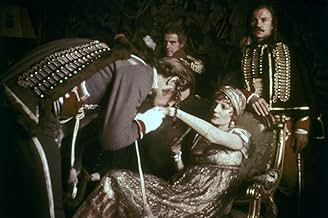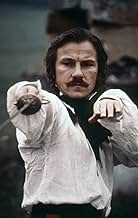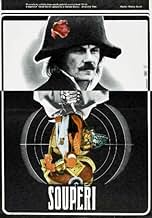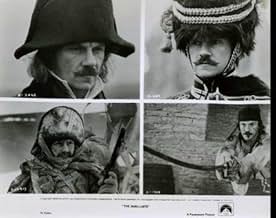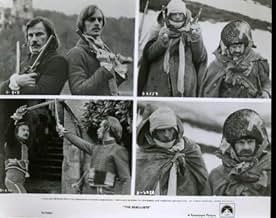IMDb-BEWERTUNG
7,4/10
28.696
IHRE BEWERTUNG
Eine kleine Fehde zweier napoleonischer Offiziere entwickelt sich zu einer jahrzehntelangen Serie von Duellen.Eine kleine Fehde zweier napoleonischer Offiziere entwickelt sich zu einer jahrzehntelangen Serie von Duellen.Eine kleine Fehde zweier napoleonischer Offiziere entwickelt sich zu einer jahrzehntelangen Serie von Duellen.
- Regie
- Drehbuch
- Hauptbesetzung
- Nominiert für 2 BAFTA Awards
- 2 Gewinne & 4 Nominierungen insgesamt
Empfohlene Bewertungen
The whole touch and "feel" of this marvellous movie is like slowly sipping a wonderfully rich and satisfying glass of superb wine. At regular moments throughout the film, the director takes the time to give you a photographic setting of the scene and you feel like you're looking at some great painting or masterpiece on canvas while still looking at a piece of atmospheric photography. The duelling is rivettingly realistic and the characters of the two main protagonists are rounded, deep and fascinating. Keitel is just a plain nasty man who is arrogant, hate-filled and remorselessly vindictive, never forgetting an enemy, even one of his own creating from an imagined slight. The resulting feud drags on for about 15 years, with Keitel determined to avenge himself and kill his more honorable and sometimes rather bemused arch-enemy out of blood-lust, pure vindictiveness and a desire to inflict a humiliating defeat - something he is repeatedly denied. The end solution is perfect. Sit back and enjoy a brilliant and ageless portrayal of two men caught up in the Napoleonic Wars, including the mercilessly cold Retreat from Moscow. Usually I don't particularly care for this kind of repeat-fighting gendre of a movie but this somehow manages to climb out of that kind of a mire. Out of 10, I rate this another flawless 10.
This /is/ one of the best sword-fighting movies ever made, in that the choreography doesn't look like choreography. In the fight sequences, there's that rare sense of reticence, chance, uncertainty: of men thinking while they fight and trying to stay alive (The battle scenes in Kurosawa seem to me to share the same quality).
What sets this film apart (beyond its sheer visual gorgeousness) is its unremitting humanity and realism. Carradine as the protagonist is a decent enough, reasonable enough chap trying to live by an unreasonable and inflexible code. Keitel as Feraud is a cipher: charged with a wholly unreasonable hate the sources of which we never see. The movie steps through the ups and downs of war, fashion, politics. Though the film's structured around a series of violent combats, the struggle is finally a moral one. One man finally transcends the ideal of honor that's kept him a prisoner for fifteen years. The other is unable to.
This is a movie to watch, and to recommend to one's friends. It's lamentably not available yet in DVD, but can be found occasionally as a rental. Watch it for the costumes, the lighting, and the gorgeous camerawork. Watch it again for a movie that takes on The Big Issues. Brilliant.
What sets this film apart (beyond its sheer visual gorgeousness) is its unremitting humanity and realism. Carradine as the protagonist is a decent enough, reasonable enough chap trying to live by an unreasonable and inflexible code. Keitel as Feraud is a cipher: charged with a wholly unreasonable hate the sources of which we never see. The movie steps through the ups and downs of war, fashion, politics. Though the film's structured around a series of violent combats, the struggle is finally a moral one. One man finally transcends the ideal of honor that's kept him a prisoner for fifteen years. The other is unable to.
This is a movie to watch, and to recommend to one's friends. It's lamentably not available yet in DVD, but can be found occasionally as a rental. Watch it for the costumes, the lighting, and the gorgeous camerawork. Watch it again for a movie that takes on The Big Issues. Brilliant.
10matija
Often, when you watch a movie, you can tell when it was made.
It deals with the mores and prejudices of the time it was made. The costumes are done without attention to detail or the hair-styles of the leading actors don't belong to the time when the movie is supposed to be taking place.
Not this movie.
It deals with timeless themes: courage, fate, inevitability,
honor. The costumes are impeccable, and even the hair-styles change as time progresses, exactly as the fashions changed during the times of the Napoleon. Without knowing the actors (though the cast is composed of excellent, justifiably famous artists), there is no way to tell it was made in 1977. It might have been made yesterday, or it might have been filmed on the spot.
If you enjoy a movie where attention was paid to every detail to make it a true piece of art, if you enjoy dramatic photography thoughtful themes, and just the barest suggestion of dry humor, this is the movie for you.
It deals with the mores and prejudices of the time it was made. The costumes are done without attention to detail or the hair-styles of the leading actors don't belong to the time when the movie is supposed to be taking place.
Not this movie.
It deals with timeless themes: courage, fate, inevitability,
honor. The costumes are impeccable, and even the hair-styles change as time progresses, exactly as the fashions changed during the times of the Napoleon. Without knowing the actors (though the cast is composed of excellent, justifiably famous artists), there is no way to tell it was made in 1977. It might have been made yesterday, or it might have been filmed on the spot.
If you enjoy a movie where attention was paid to every detail to make it a true piece of art, if you enjoy dramatic photography thoughtful themes, and just the barest suggestion of dry humor, this is the movie for you.
I come to this after a week of heavily mulling over Nolan's Batman world and the failure of logical tools to explain beyond themselves. And here is a film about a deeply-seated illogical drive, and by one who inspired Nolan, by his own admission, and you can perhaps see that in the series of escalating encounters with a madness that trumps reason.
And the immersive world. Scott usually aims for this, and this is from a time he did it well. He takes from Kubrick the idea of natural light that, once the camera locks in, will look and move (and slightly breathe) like a Romantic painting. The era is Napoleon's, and at least the wintry march back from Russian defeat provides opportunity for some astonishing images.
Some words exhaust their meaning, when thrown without care; so it's not enough to call this existentialist. The story is that an army officer bears an inexplicable grudge that spans 20 years and half of Europe.
Everything you need to know is in the last scene, expertly executed. The idea is that something deeply not-logical gnaws and eats at man's soul and sniffs for blood. And that men, this is strictly male, have lived with this aspect of self for so long, we have developed separate not-logical tools that allow us to not only instinctively respond to the call, however reluctantly, and in spite of recognition of how insane it is, but to silently respect and defend it as its own kind of logic (in our case, the concept of honor).
In the last scene, we have two men seeking each the other to eliminate him from existence, as simple as that. It's the oldest game men have played, and the same thrill resurfaces across poker tables and football. It's got to have something of death in it, if it is to matter at all.
And I have a book called Bushido: The Soul of Japan here with me, retrieved from a shelf because the film sparked an interest, that explains how the blade is the samurai's extension of soul and imbued with the same discipline.
The two rivals have fenced for the entire film, but settle on pistols for the deciding duel, and wander about in a forest, two shots each, meaning they will be able to instantly discharge what is in their soul.
Each man in the shot he takes reveals who they are, one of them rash and impertinent, and fires first, they other level-headed and reserved. The subtle context of the scene is that politics do decide war from afar, in our case the slippery (faulty) pair of boots of the aristocratic boot-maker.
Which is, in a third level, a beautiful way of putting the subtle discord strummed by the universe that creates a slippery world and illogical selves of us, dumb chance as fate.
And suffice to say, the film is British, so you will not learn it here, but in spite of the probably British-started legend, the French are historically the best tactical warriors in Europe. There is a reason why nearly every word in the modern lexicon of war is originally French, and that includes honour.
And the immersive world. Scott usually aims for this, and this is from a time he did it well. He takes from Kubrick the idea of natural light that, once the camera locks in, will look and move (and slightly breathe) like a Romantic painting. The era is Napoleon's, and at least the wintry march back from Russian defeat provides opportunity for some astonishing images.
Some words exhaust their meaning, when thrown without care; so it's not enough to call this existentialist. The story is that an army officer bears an inexplicable grudge that spans 20 years and half of Europe.
Everything you need to know is in the last scene, expertly executed. The idea is that something deeply not-logical gnaws and eats at man's soul and sniffs for blood. And that men, this is strictly male, have lived with this aspect of self for so long, we have developed separate not-logical tools that allow us to not only instinctively respond to the call, however reluctantly, and in spite of recognition of how insane it is, but to silently respect and defend it as its own kind of logic (in our case, the concept of honor).
In the last scene, we have two men seeking each the other to eliminate him from existence, as simple as that. It's the oldest game men have played, and the same thrill resurfaces across poker tables and football. It's got to have something of death in it, if it is to matter at all.
And I have a book called Bushido: The Soul of Japan here with me, retrieved from a shelf because the film sparked an interest, that explains how the blade is the samurai's extension of soul and imbued with the same discipline.
The two rivals have fenced for the entire film, but settle on pistols for the deciding duel, and wander about in a forest, two shots each, meaning they will be able to instantly discharge what is in their soul.
Each man in the shot he takes reveals who they are, one of them rash and impertinent, and fires first, they other level-headed and reserved. The subtle context of the scene is that politics do decide war from afar, in our case the slippery (faulty) pair of boots of the aristocratic boot-maker.
Which is, in a third level, a beautiful way of putting the subtle discord strummed by the universe that creates a slippery world and illogical selves of us, dumb chance as fate.
And suffice to say, the film is British, so you will not learn it here, but in spite of the probably British-started legend, the French are historically the best tactical warriors in Europe. There is a reason why nearly every word in the modern lexicon of war is originally French, and that includes honour.
Maybe I just don't get around much. Perhaps I just need to expand my universe. Whatever the case, I am convinced that The Duellists is the best film I have ever taken the time to watch. I felt the fear, I felt the cold, this movie just plain made me feel. Great acting and great filming, great haunting soundtrack, probably reasons why I have watched this movie half a dozen times. Have not found many folks that share my enthusiasm for this film. Perhaps I have 20/20 vision, and everyone else has cataracts.
Wusstest du schon
- WissenswertesSir Ridley Scott said that after having directed anywhere from 1,500 to 2,000 television commercials, he realized no one was going to approach him about directing a film, so he'd have to take the lead. Since his funds were limited, he used a public domain source for the story, and commissioned the script for this movie on his own.
- Patzer(at around 1h 23 mins) Faraud, loading his pistol, drops a ball into the barrel and then rams it into place. When the ball drops,a metallic sound is heard, indicating that there is no powder in the barrel.
- Zitate
Armand D'Hubert: General Feraud has made occasional attempts to kill me. That does not give him the right to claim my acquaintance.
- Crazy CreditsOpening credits prologue: STRASBOURG 1800
- VerbindungenFeatured in Moviedrome: Double Bill - The Duellists/Cape Fear (1991)
- SoundtracksBist du bei mir
(uncredited)
Music by Gottfried Heinrich Stölzel
from "Notenbüchlein für Anna Magdalena Bach No. 25. BWV 508"
Written by Johann Sebastian Bach (uncredited)
Top-Auswahl
Melde dich zum Bewerten an und greife auf die Watchlist für personalisierte Empfehlungen zu.
Details
- Erscheinungsdatum
- Herkunftsländer
- Sprachen
- Auch bekannt als
- Los duelistas
- Drehorte
- Château de Commarques, Dordogne, Frankreich(final pistol duel)
- Produktionsfirmen
- Weitere beteiligte Unternehmen bei IMDbPro anzeigen
Box Office
- Budget
- 900.000 $ (geschätzt)
- Weltweiter Bruttoertrag
- 568 $
Zu dieser Seite beitragen
Bearbeitung vorschlagen oder fehlenden Inhalt hinzufügen



